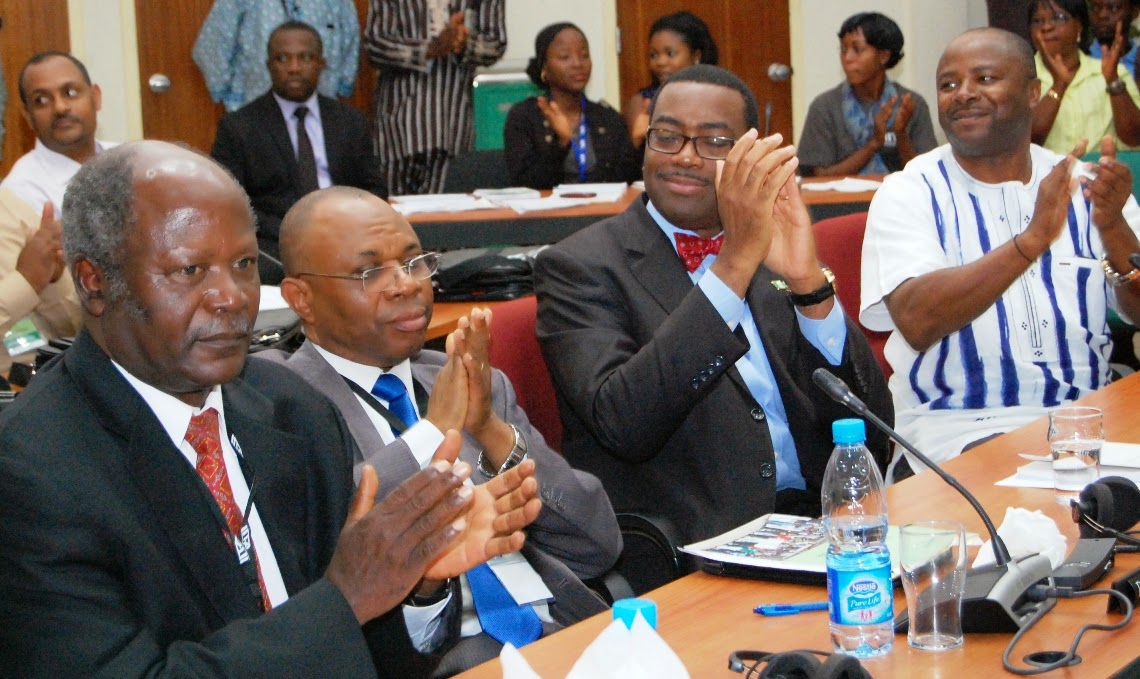In a keynote address, Dr Namanga Ngongi, IITA Board member
said tapping into the entrepreneurial spirit of Africa’s young men and women
was a sure way to move the development agenda of Africa forward in a
sustainable manner.
He proposed the adoption of a transformative agenda, one that would convert African agriculture into a vibrant and economically viable and sustainable business sector that is attractive to the youth.
For this to happen, Dr Ngongi said appropriate tools and machines that would ease the tedium of agricultural work and make the sector attractive to youths and less exacting on women were desperately needed.
According to him, it is not enough to make pious declarations that accord priority to agriculture.
“The declarations should be backed by concrete policies and programs that will lead to transformation of the sector at scale,” he said.
The IITA BoT member said African agriculture needed a new group of actors, persons who see opportunities and take action including risks, to turn opportunities into profitable ventures.
“They do not normally have the opportunity to test a business idea before taking it to the market place as few countries have any functioning start-up or risk sharing programs. Young people in particular are disadvantaged as they do not have access to even a minimum of capital,” he stressed.
Dr Chiji Ojukwu, Director, Agriculture and Agro-Industry Department, African Development Bank reechoed that exploiting opportunities to enlist and hold the interest of the African youth and women in agriculture was crucial if African countries were to meet the growth and poverty reduction targets under the Comprehensive Africa Agricultural Development Program (CAADP) and the Millennium Development Goals (MDGs).
He said the Bank was pleased with the successful multiplication and dissemination of improved crop varieties by the IITA Agripreneurs under the SARD-SC project.
Dr Ojukwu shared the Bank’s experience which showed that youths were willing to go for modern agriculture and agribusiness that are supported with the necessary services including science and technology, finance, and real time market information among others.
Finally, he reiterated the Bank’s commitment to supporting agriculture with the view to achieving inclusive growth in the continent.
 |
| L-R: Drs Ngongi, Ojukwu, Akinwumi Adesina(Nigeria's Minister of Agriculture), and Dr Nteranya Sanginga at the Youth Workshop in IITA Ibadan |
Dr Ngongi spoke at
the just concluded workshop on Engagement of Youth Entrepreneurship for
Agricultural Transformation in Africa held from 28 to30 May at IITA, Ibadan,
Nigeria.
Painting a picture
of the current situation in Africa, Dr Ngongi noted that in spite of the
natural resources that favor agricultural production, the continent’s 25
percent population still goes to bed hungry and that malnutrition was still
widespread despite continental efforts to change Africa’s agricultural
narrative.He proposed the adoption of a transformative agenda, one that would convert African agriculture into a vibrant and economically viable and sustainable business sector that is attractive to the youth.
For this to happen, Dr Ngongi said appropriate tools and machines that would ease the tedium of agricultural work and make the sector attractive to youths and less exacting on women were desperately needed.
According to him, it is not enough to make pious declarations that accord priority to agriculture.
“The declarations should be backed by concrete policies and programs that will lead to transformation of the sector at scale,” he said.
The IITA BoT member said African agriculture needed a new group of actors, persons who see opportunities and take action including risks, to turn opportunities into profitable ventures.
“These are the
entrepreneurs and in the agriculture sector, agro-entrepreneurs. This group of
actors, young for the most part, will be needed to provide services to the
agriculture sector throughout the value chain, from the provision of improved
seeds and other planting materials to land preparation; from planting to
harvesting; from storage to processing and transformation of raw agricultural
commodities to finished food and industrial products,” he explained.
He noted that though the agro-entrepreneurs do have the
interest and the will to take risks, most often they lack the business skills
to manage an enterprise profitably. “They do not normally have the opportunity to test a business idea before taking it to the market place as few countries have any functioning start-up or risk sharing programs. Young people in particular are disadvantaged as they do not have access to even a minimum of capital,” he stressed.
Dr Chiji Ojukwu, Director, Agriculture and Agro-Industry Department, African Development Bank reechoed that exploiting opportunities to enlist and hold the interest of the African youth and women in agriculture was crucial if African countries were to meet the growth and poverty reduction targets under the Comprehensive Africa Agricultural Development Program (CAADP) and the Millennium Development Goals (MDGs).
He said the Bank was pleased with the successful multiplication and dissemination of improved crop varieties by the IITA Agripreneurs under the SARD-SC project.
Dr Ojukwu shared the Bank’s experience which showed that youths were willing to go for modern agriculture and agribusiness that are supported with the necessary services including science and technology, finance, and real time market information among others.
Finally, he reiterated the Bank’s commitment to supporting agriculture with the view to achieving inclusive growth in the continent.
.gif)






